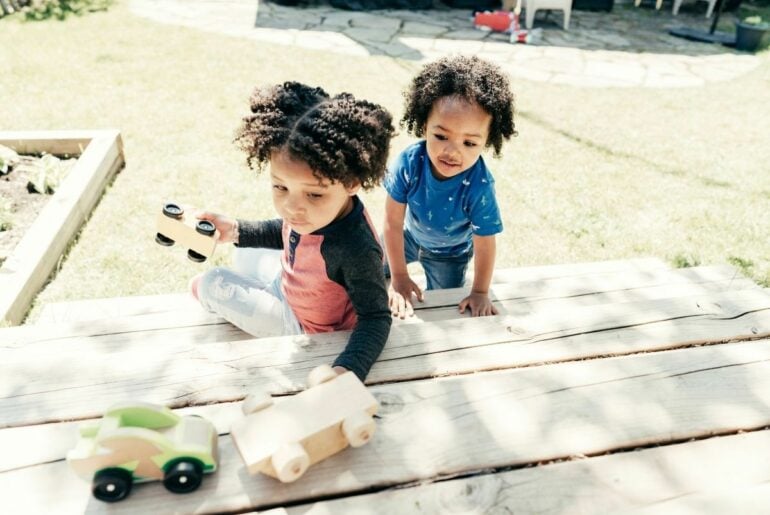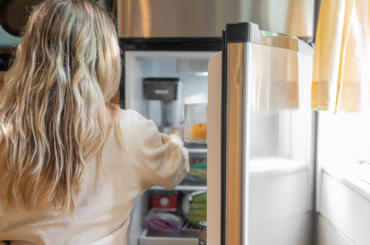Young kids can learn so much from playing in the company of other kids! But some parents may be wondering how they can beef up toddlers’ and preschoolers’ social skills when their little ones are on summer break or haven’t started school/daycare yet.
First, it’s important to understand the natural and gradual way that young children learn to play together. When young toddlers (ages 1-2) play, they don’t really play with others anyway — even if they’re next to other children who are doing a similar activity, they don’t usually interact much with them. This behavior is typical of the age and is known as “parallel play.”
When a child is anywhere from 2 to 4 years old, they’ll often start to widen their playing interests to include other children, so parallel play gradually turns into associative play. With associative play, kids pay more attention to each other and may even do an activity together loosely — like adding blocks to the same block tower but without any sort of plan or goal, or chasing each other around without any agreed-upon rules to their game.
Then around age 4 or older, kids begin to move into cooperative play, where they are interested in working together with others toward a common goal, or following/establishing rules to make an interactive game work.
Toddlers and preschoolers might not be ready for complex games that involve a lot of teamwork or cooperation, but it’s still great for their social skills to offer opportunities to play together.
All of the following activities can be done outdoors for added summer fun!
Washing toy trucks/cars
Teach kids to take turns, work together, and find a helpful role in this game by talking about different “jobs” like scrubbing with a sponge/brush and rinsing with a hose/bucket of clean water. Plus, they’ll learn how to clean and take responsibility for their toys—while cooling off with water!
Building with found materials
Supply materials like plastic containers, cardboard boxes and tubes, sticks, and different kinds of tape. Encourage kids to work together to build a big castle, a made-up animal, or anything they want. (Adults can help with cutting or other tasks as needed.) Preschoolers will be developing problem-solving skills as well as getting practice listening to a friend’s ideas.
Mud kitchen
Bring lots of sturdy, easily washable containers and utensils outside and let kids mix water, dirt, stones, etc. to make the imaginary feast of their dreams. Kids can develop teamwork skills by finding different roles such as gathering materials, mixing, or serving food.
Outdoor blocks
Bring plastic blocks outside and let kids build anything they want. For a summery twist, supply containers of water or ice, and see what that adds to their creations. Whatever activity they come up with, there will likely be great opportunities for kids to imitate each other’s actions and fuel each other’s imaginations.
Side-by-side sidewalk chalk
Kids may be more inspired (aka less bored) drawing next to others instead of by themselves. Just supply some simple outdoor drawing materials and there will be ample opportunities for developing motor skills, sharing, taking turns, and discussing what their friend is making.
Transporting a load
Start with one large container full of water, ice, blocks, or balls. Then put an empty container several feet away, and ask kids to help transfer the materials from one bin to the other. (Have some tools on hand like cups, spoons, tongs, or toy dump trucks.) Kids will be able to see what methods the other child is using, and try to copy them or suggest others.
Playing catch
A game as simple as rolling or tossing a ball back and forth can be quite a learning experience for toddlers and preschoolers. They have to figure out how to wait for their turn, watch the other child’s actions, and coordinate their own movements.
Shapes in the sand or dirt
If you don’t have access to a beach or sandbox, you can try this with plain old soil, or even a bin of cornmeal. Provide materials that can draw or mold different shapes in the sand/dirt, and see if kids can copy each other’s shapes. It’s educational and creative while also providing a chance for your kid to observe another child’s style of play.
Car races
Gather up some toy trucks and cars, mark a start and finish line, and have a simple race! This adds a fun, interactive element to kids playing with cars or trucks by themselves, because they’ll be motivated to notice what the other child is doing.
Throw at a target
Similar to a ball and hoop, or a bean bag toss, you can create your own summery target game using wet sponges and a homemade bullseye. Either draw circles with chalk on the ground, or put out shallow bins to aim for. Encourage kids to take turns throwing in order to help them develop a better awareness of their playmates.
Collect rocks, shells, or sticks
Have kids collect a certain type of object from nature and put them into one container. Then let them play together with their shared bounty. Kids may begin to notice the size, color, or quantity of objects their friend is picking up, and may also find new ways to play with them afterwards by watching their friend.
Water spray
A sprinkler, hose, or even spray bottles can lead to all sorts of spontaneous outdoor summer fun. Even if kids don’t start off playing together, all of the giggling and shrieking can lead to interaction, or at least enjoying each other’s company.
Toy hide-and-seek
Younger toddlers and preschoolers might not actually be able to execute traditional hide-and-seek (plus then you might worry about losing track of kids outside, depending on where you are). But you can encourage them to look for each other’s hidden toy trucks, balls, animals, or other objects in the yard or another designated area. Kids may end up copying each other’s hiding spots or revealing their own hiding spots, but it’s still fun and interactive!
Bath toy show-and-tell
Fill a big container of water, and have each child bring some of their own (clean) floating toys and cups. Kids will have fun discovering and talking about each other’s toys, and will have a chance to practice taking turns and sharing the toys. Plus they’ll get to cool off!







